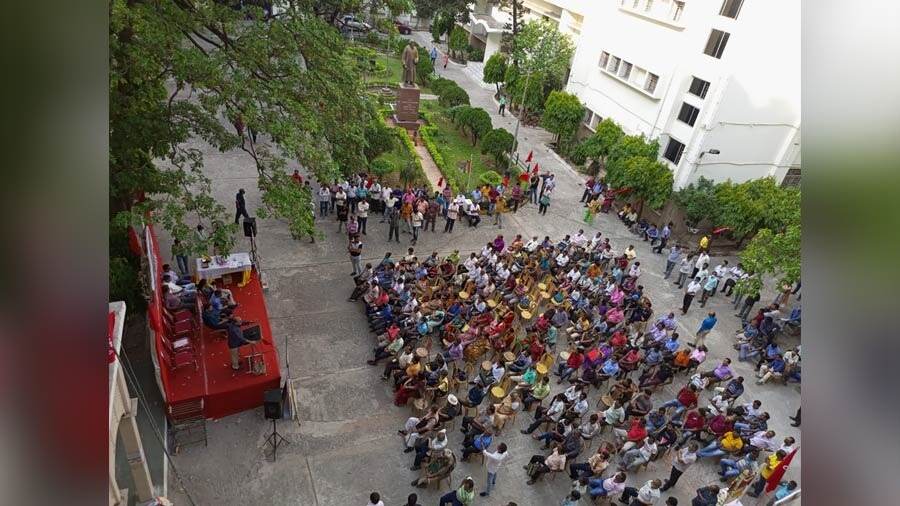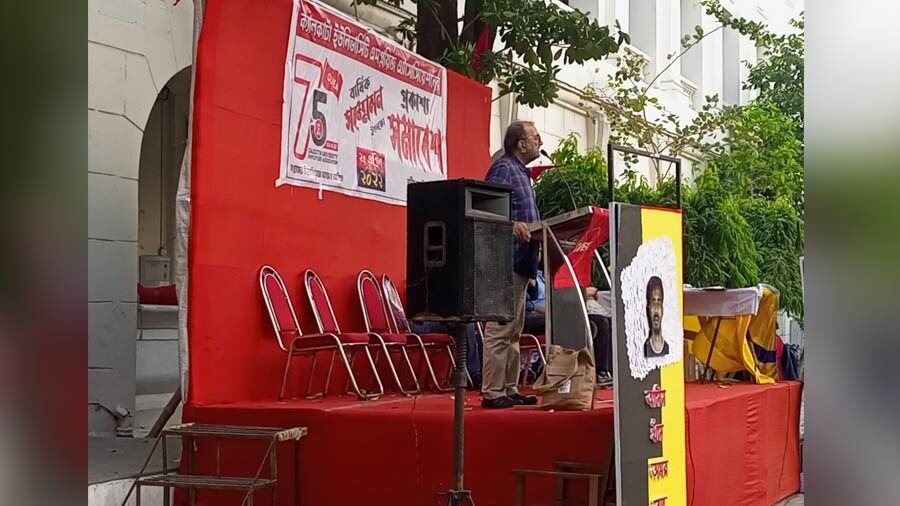Former mayor Bikash Ranjan Bhattacharya has been snapped on camera using a microphone at an open-air meeting inside Calcutta University’s College Street campus, long declared a silent zone, but environment activists and officials said the violation and subsequent inaction merely summed up a wider malaise.
An environment activist said Monday’s transgression underlined the difficulties of enforcing norms and punishing noise-rule violations, both in Kolkata and across West Bengal.
“Somebody violated the rules in broad daylight in front of hundreds of people but nobody, including police, could see or hear anything. No complaint was lodged, hence no case has been filed and no action could be taken,” an activist associated with the environment platform Sabuj Mancha said.
Education institutes are “silent” zones and use of microphones in the open is banned within 100 metres of such campuses.
Bhattacharya, a CPM Rajya Sabha MP, did not deny using a microphone but claimed that permission had been obtained from varsity authorities. A senior university official, however, said any clearance was out of the question because use of microphones in the open within the campus was illegal.
Bhattacharya, who is also a well-known lawyer, spoke for about 15 minutes at the open plenary of an annual conference organised by the Calcutta University Employees’ Association. Two large amplifier boxes were part of the sound system when he addressed the gathering of about a few hundred people.
The campus meeting had been arranged despite a February 7, 2008, gazette notification of the West Bengal government that had declared the College Street area from “Medical College Hospital to Presidency College and its 100 metres surrounding” as an exclusively “Silent Zone”.
Presidency College has since been elevated to the status of a university and is now known as Presidency University.
An environment activist who had gone to the Calcutta University campus on Monday clicked photographs of Bhattacharya addressing the employees’ association. “During the meeting I was on the College Street campus for some personal work and saw Bhattacharya speaking into the microphone using big boxes in clear violation of environmental norms. I was amazed, he is a lawyer himself, ” the activist told The Plurals. The activist requested not to be named but shared the photographs he had clicked.
Bhattacharya admitted that he had used a microphone at that April 25 meeting but said “requisite permission was taken from the university authority”. Asked how he could use a microphone in a silent zone, he repeated that permission had been obtained.

A photograph of the meeting clicked from above
‘Permission? It’s illegal’
A senior university official countered Bhattacharya’s claim. “How can we give any permission to use microphones (in the open) within the campus when everybody knows it’s illegal?” the official said.
Environmentalist Subhas Datta said police should have booked Bhattacharya on their own. “It’s a blatant violation of noise rules and police should have lodged an FIR suo motu,” he said.
Biswajit Mukherjee, former chief law officer, West Bengal Pollution Control Board (PCB), agreed with Datta. “(It was) completely illegal. Forget about the university campus; the entire area with so many academic institutions was declared a silent zone many years back; police should not have allowed it.”
According to noise-control rules, any use of microphones in the open requires police clearance.
“We were neither asked nor have we given any permission to use microphones within the university campus,” the officer-in-charge of Jorasanko police station told The Plurals.
Asked why the police did not take any action despite the obvious violation, the officer said, “Police were outside the gate.”
The officer said the police had not received any complaint regarding the violation.
A lawyer who handles environment-related cases said transgressions such as this come under Section 15 of the Environment Protection Act, 1986, and the punishment, if found guilty, could be jail for up to five years or a fine of up to Rs 1 lakh, or both.
Rule, rather than exception
A university official said the Bhattacharya incident was not an exception. “Rather, breaking rules seems to be the rule, as all political parties use microphones within the campus and blatantly violate the noise norms. This has now become an established practice.”
Lawyer Mukherjee said this applied to the rest of the state too. “All political parties and leaders break the noise rules throughout the state, with the administration, be it the PCB or the police, looking in the other direction.”
On Monday, the eastern zonal bench of the National Green Tribunal had criticised the police for their inaction in maintaining noise norms and called the force’s monitoring of noise pollution “an eyewash”.
The scathing comment summed up how far the city and the state have slipped up on enforcing noise-pollution rules since the late 1990s. Back then, the rest of the country would look up to the city as the benchmark in the area of controlling noise pollution after the late Justice Bhagwati Prasad Banerjee passed a series of pioneering orders and ensured that the then state administration acted against noise violators.
